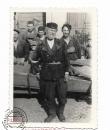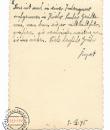Jewish - Jude - Nice photo of an eldery Jew in Ghetto Kielce, Poland taken by a German in 1940 and described on the reverse
| Price: | $120.00 |
Nice photo of an eldery Jew in Ghetto Kielce, Poland taken by a German in 1940 and described on the reverse. We can see, reading the text on the back of the photo, that the man who took the photo was making fun from this Jew. Text says that when the Jews realised they were being ridiculised with jokes, they vanished. 2 years later this man and maybe all those Jews behind him in the photo were sent to death in Treblinka or shot to death. Photo is in excellent condition. The Kielce Ghetto was a Jewish World War II ghetto created in 1941 by the Schutzstaffel (SS) in the Polish city of Kielce in the south-western region of the Second Polish Republic, occupied by German forces from 4 September 1939. Before the Nazi invasion of Poland in 1939, Kielce was the capital of the Kielce Voivodeship. The Germans incorporated the city into Distrikt Radom of the semi-colonial General Government territory.[1] The liquidation of the ghetto took place in August 1942, with over 21,000 victims (men, women and children) deported to their deaths at the Treblinka extermination camp, and several thousands more shot, face-to-face. There was a considerable Jewish presence in Kielce. The Kehilla operated two synagogues, a beth midrash house of learning, a mikveh, the cemetery with ohalim, an orphanage, a retirement home, three elementary schools, two high schools, a Talmudic college and a large Tarbut library with 10,000 volumes. There were also numerous organizations and societies including two sports clubs. Nevertheless, the economic crisis of the 1930 prompted many younger Jews to emigrate before the war began, mostly to America.RVC






